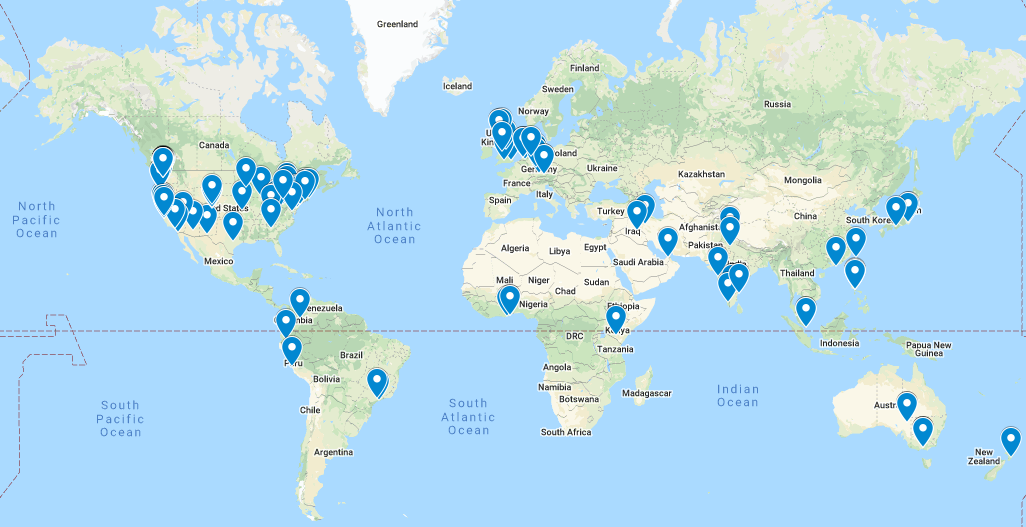The 10th IEEE Global Humanitarian Technology Conference (GHTC 2020) was held online on October 29- November 1 via Zoom. GHTC is an international flagship conference sharing practical technology enabled solutions addressing the needs of underserved populations and resource constrained environments around the world and the United Nations Sustainable Development Goals (UNSDG). Specifically:
- Agriculture & Food Security (UN SDG2)
- Good Health and Well Being (SDG3)
- Quality Education (SDG4)
- Clean Water & Sanitation (SDG6)
- Affordable & Clean Energy (SDG7)
- Decent Work and Economic Growth (SDG8)
- Connectivity & Communication in Support of Development
- Disaster Mitigation, Preparedness, Response & Recovery
- Other UN SDGs e.g. (9, 11, 12, 14)
Attendees:
There were 149 registered attendees from 22 countries. Additionally, there were participants during the conference from the Committee, workshop presenters, panelists, speakers, press and session chairs. The map below shows the worldwide distribution of attendees.
Registration breakdown:
- Total Registrations: 149
- Presenters: 117
- 1st GHTC: 68.6%
- IEEE Member: 61.9%
- Students: 3%
The Plenary Program sessions only were offered free and open to all with 109 unique registrations received.
Program Highlights
The Conference program featured workshops, keynote sessions, panels and special events. We also held a Student Poster Competition on Thursday evening.
The technical program consisted of 24 paper sessions with 120 papers including 3 posters.
- 3 sessions on Agriculture & Food Security (UN SDG2)
- 5 sessions on Good Health and Well Being (SDG3)
- 1 session on Quality Education (SDG4)
- 2 sessions on Clean Water & Sanitation (SDG6)
- 3 sessions on Affordable & Clean Energy (SDG7)
- 4 sessions on Connectivity & Communication in Support of Development
- 3 sessions on Disaster Mitigation, Preparedness, Response & Recovery
- 3 sessions on Other UN SDGs
Thursday Oct. 29
- Three morning workshops which were included with full conference registration.:
- Sustainable Project Design Considering COVID-19 Pandemic (Prof. Shaikh Fattah, Education Chair, IEEE HAC)
- Machine Learning for Social Good (speakers from Bill Gate’s Global Health Labs)
- Fundamentals of Off-Grid Electrical Systems (Henry Louie)
- Afternoon: Three parallel paper sessions
- Opening session after paper sessions with remarks by IEEE President Toshio Fukuda and President-elect Susan (Kathy) Land
- Evening (5-7pm) Student Poster Competition with attendee option to select the People’s Choice Award.
- Judges Award ($750) AND People’s Choice Award ($250) went to the poster “Decreasing Water Usage and Increasing Income for Vietnam Small Farmers: Modeling Plant Stress with Handheld Infrared Thermometers” by Katie Pascavis of Arizona State University.
- Technical Award ($500) went to the poster “A Review on Image-Based Wildfire Detection Systems” by Jordan Johnston of Sonoma State University.
Friday Oct. 30
- Energy Panel session: “Technology-enabled climb up the demand-driven energy ladder: Interoperability, Growth, All-access”, organized by IEEE PELS and with “Empower a Billion Lives”
- Three parallel tracks with paper presentations in morning and afternoon.
- Special Interest Session: “EPICS in IEEE – empowering students solve local community problems”
- Networking time: Kept the last presentation sessions Zoom open for 30 minutes or more to allow attendees an opportunity for discussion and networking
Saturday Oct. 31
- Three parallel tracks with paper presentations in morning and afternoon.
- COVID Panel: IEEE Humanitarian Activities Committee (HAC) Panel on COVID-19
- GHTC 10th Anniversary Celebration with panel with GHTC originators and panel with past IEEE/IEEE-USA presidents on “IEEE’s Role in Humanitarian Technology and Sustainable Development”
- Special Interest Session: Diversity and Inclusion in Engineering sponsored by IEEE-USA
- Networking time after last sessions
Sunday Nov. 1
- Three parallel tracks with paper presentations
- Closing Session featuring a keynote with Melissa Sassi, IEEE Digital Intelligence Working Group on “DQ, a measure for determining one’s digital intelligence”






